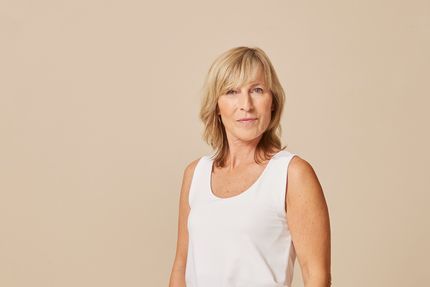Bloating, abdominal pain and menopause
Your hormones and your gut health are intricately linked. In midlife, hormonal changes during menopause can affect your digestive system, causing symptoms like bloating and abdominal pain. A bloated tummy can also be accompanied by unpleasant side effects such as abdominal fullness or constipation. What causes these symptoms, and what can you do about them?

My tummy often feels swollen, especially after dinner. It puts me off eating because I feel so full. When I'm at home I almost always walk around in sweatpants. - Julia (age 52)

Feelings of fullness and a bloated stomach, which is often accompanied by abdominal pain, are typical symptoms of menopause. Your stomach may look bigger, which can make you feel self-conscious, or it can make your clothes fit tighter. All this can make your daily life more challenging.
Most women will experience digestive issues, such as flatulence, constipation, bloating and abdominal pain, in the two years surrounding their final menstrual period (menopause). This is when hormone fluctuations are most dramatic. In postmenopause, once the body adjusts to a new hormonal environment and hormone levels remain at a constant low level, most symptoms will improve. Mind you, we are all unique, so each person may have slightly different symptoms and their duration and severity may also vary. The good news is there is a lot you can do to prevent or alleviate symptoms yourself.
What is happening in your body?
Many menopausal women experience bloating or have a bloated stomach at various points throughout the day. It's a common and usually harmless symptom of menopause. A bloated stomach feels swollen and tight. It's often accompanied by flatulence (wind), rumbling, constipation, abdominal pain or stomach cramps. Bloating does not necessarily result from menopause, but shifts in your hormones are often a contributing factor.
Here's why. Levels of oestrogen and progesterone in the body decline in the years leading up to menopause. The drop in progesterone speeds up during perimenopause, causing an oestrogen dominance effect in the body. The excess of oestrogen can lead to decreased bile flow (bile is a fluid that helps with digestion), causing the intestines to become weaker, your digestion to slow down and intestinal gas to build up. This can result in symptoms such as bloating, constipation, or shooting pains and cramps.
Hormonal changes can also affect the fluid balance in the body. Elevated oestrogen levels increase fluid retention, causing your belly to swell. This can make you feel bloated and gassy, or constipated.
Other causes
Bloating and abdominal pain can also be caused by less obvious factors, such as stress, swallowing too much air when eating, or a food allergy or intolerance (you can also develop allergies later in life). Also, high levels of cortisol, the stress hormone, can slow down digestion or impact bowel movements, leading to constipation, bloating or abdominal pain. Certain medicines or health conditions can also cause or exacerbate abdominal problems.
What can you do?
The first step towards a solution is to look at what goes into your gut: your diet. Here are some tips to reduce abdominal discomfort:
- Eat mindfully and slowly. Focus on eating without distractions like smartphones or TV shows. Taking your time will help you swallow less air and reduce flatulence.
- Eat unprocessed foods and avoid processed foods (canned, preserved or packaged foods). Processed foods have added salt and sugar, which can worsen bloating.
- Eat more fibre. Fibre helps your digestion. Make sure your diet is rich in vegetables, fruit, whole grain products, nuts and seeds.
- Make sure your diet includes healthy fats. Healthy fats stimulate bile production, which is good for digestion. Healthy fats can be found in avocados, ghee and nuts.
- Cut back on coffee and alcohol. Caffeine and alcohol irritate the stomach and gut. They are also diuretics: they cause your body to expel lots of water, which may lead to dehydration and constipation. A better option is water or herbal tea.
- Have you ever wondered if you might have an allergy? Have yourself tested. If you have a reaction after eating a particular food on a regular basis, you should see your doctor to determine whether you have a food intolerance or allergy.
- Consider taking a supplement. High-quality dietary supplements can be a good way to fill any dietary gaps, which can be helpful during menopause.
Here are some lifestyle tips that you can implement to improve gut health:
- Do you have a sedentary job? Get up from your desk every hour. Or ask for a standing desk. Sitting down can cause your abdomen to compress, which slows down digestion. By getting up every hour and walking, you stimulate your intestines.
- Being physically active improves digestion. Get at least 30 minutes of physical activity a day in addition to your normal activities. Going for a walk after dinner gives your body the chance to digest your food. Walking after eating is also a proven way to stabilise blood sugar and improve mood. A win-win for everyone!
Your path to a smooth menopause starts here
Get the tools you need to navigate menopause with more ease and to educate yourself about your body. With tips and insights from experts, and relatable stories of women just like you. Press play, not pause.
What treatments can help?
Menopause can cause severe bowel issues, such as bloating, pain or flatulence. As uncomfortable as these symptoms can be, we aren't helpless. There are ways to manage them! Bowel issues can have different origins: hormonal imbalances, stress or intolerances. A healthy and varied diet is always the first step in improving your gut health.
Can hormone therapy help?
Hormone replacement therapy (HRT) replaces the hormones a woman's body stops making due to menopause. HRT can be an effective way to treat severe symptoms, such as sleep problems, mood swings and vaginal dryness.
Do you have any of these symptoms as well bowel issues? Are your symptoms getting in the way of your daily life? If dietary and lifestyle adjustments do not provide sufficient relief, then hormone therapy might be an option for you.
Sources
- Zu Y, Yang J, Zhang C, Liu D. (2021). The Pathological Mechanisms of Estrogen-Induced Cholestasis: Current Perspectives. PMCID: PMC8606790.
- Stachenfeld NS. (2014). Hormonal changes during menopause and the impact on fluid regulation. PMID: 24492487.
- Mattar R, de Campos Mazo DF, Carrilho FJ. (2012). Lactose intolerance: diagnosis, genetic, and clinical factors. PMID: 22826639.
- Colberg SR, Zarrabi L, Bennington L, Nakave A, Thomas Somma C, Swain DP, Sechrist SR. (2009). Postprandial walking is better for lowering the glycemic effect of dinner than pre-dinner exercise in type 2 diabetic individuals. PMID: 19560716.
Tips and advice


FAQ
What hormone causes bloating?
The production of oestrogen and progesterone declines around menopause. The drop in progesterone speeds up during perimenopause, causing an oestrogen dominance effect in the body. This excess of oestrogen can lead to reduced bile production, causing the intestines to become weaker, your digestion to slow down and intestinal gas to build up, resulting in symptoms such as bloating, constipation, or shooting pains and cramps. Oestrogen dominance can also upset the water balance in your body, which may lead to water retention and bloating.
How do I know if I have a food intolerance?
If you have a reaction after eating a particular food on a regular basis, you should see your doctor to determine whether you have a food intolerance or a food allergy.












